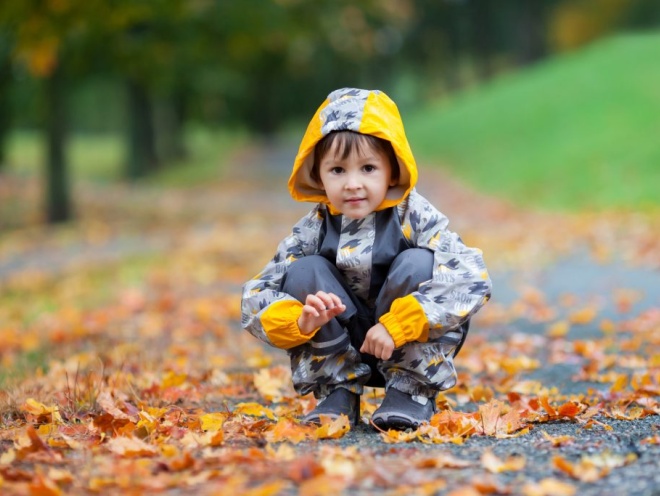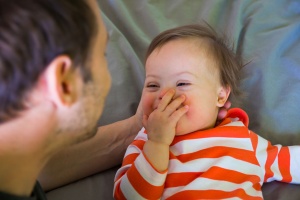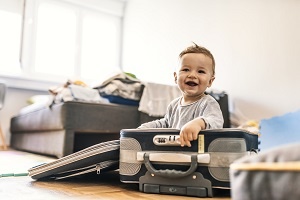Playing outside is fun, exciting and important for children’s learning and development. Here we look at how else outdoor play is great for your little one.
From enjoying a walk with your newborn in their pram, to pushing your toddler on the swings. The great outdoors gives children plenty to explore. They’ll embrace the freedom and space the outdoors gives them to shout, jump, run around, hop and skip.
Being outside is an exciting sensory experience for babies and toddlers. Babies will enjoy the exciting visuals on offer as you take them for a walk outdoors. Toddlers love the chance to explore different spaces and touch natural objects. Leaves, pinecones and puddles included.
Playing outside is really important as it gives your little one the chance to look around and learn. While you’re having fun as a family, taking your children outdoors and supporting their play is also helping their development (Frost and Sutterby, 2017). What’s more, the whole family benefits from being outside.
Here are seven benefits of outdoor play:
1. Help your baby sleep better at night
Research shows that babies sleep better at night if they’ve had some fresh air and sunshine during the day (Harrison, 2004). Definitely worth a walk or play outdoors to help your baby sleep better.
2. Outdoor play is a fun way to learn
Getting outdoors to play is a brilliant sensory experience for babies and toddlers. There is so much for them to see, explore and learn. The changing nature of the outdoors makes it an incredibly stimulating and multi-sensory place to play. This is important as babies and young children learn and gain experience through all their senses (Murray, 2014).
3. Developing motor skills
Young children need the opportunity to use their whole body and develop their gross motor skills (Frost and Sutterby, 2017). Playing outdoors in your garden or local park lets babies crawl or toddle further. As they get older, they’ll have space to run and jump outside. They can also develop their fine motor skills as they pick up natural treasures like leaves and fir cones.
4. Encourages a healthy lifestyle
Getting outdoors with your toddler can help them burn off some energy and encourages a healthy lifestyle. Through physical activity and challenges, being outdoors helps children sleep, eat, and live more healthily. This encourages them to form healthy habits for life. (The Scottish Government, 2013)
5. Care for the environment
Playing outdoors is a brilliant way to get out in nature and become aware of the environment. Children who gain knowledge and appreciation of nature are more likely to become environmentally aware adults (Littledyke, 2008).
6. Positive impact on the whole family
It’s amazing how fresh air can blow away the cobwebs and make a world of difference to how you feel as a parent. Even a short walk can do the world of good for the whole family. Especially on days after a sleepless night or when your child is feeling grumpy or grizzly at home (Harrison, 2004).
7. Make new friends
Getting outside is also a good opportunity for parents to get some gentle exercise and meet friends. From chatting to other parents in your local playground to joining a local NCT Walk & Talk.
This page was last reviewed in October 2017
Further information
Our support line offers practical and emotional support with feeding your baby and general enquiries for parents, members and volunteers: 0300 330 0700.
You might find one of our NCT New Baby courses helpful as they give you the opportunity to explore different approaches to important parenting issues with a qualified group leader and other new parents in your area.
Make friends with other parents-to-be and new parents in your local area for support and friendship by seeing what NCT activities are happening nearby.
Frost JL, Sutterby JA. (2017) Outdoor play is essential to whole child development. Young Children 72(3):82-85. Available from: https://www.naeyc.org/resources/pubs/yc/jul2017/outdoor-play-child-development [Accessed 1st October 2017].
Harrison Y. (2004) The relationship between daytime exposure to light and night-time sleep in 6–12-week-old infants. Journal of sleep research 13(4):345-352. Available from: https://www.ncbi.nlm.nih.gov/pubmed/15560769 [Accessed 1st October 2017].
Littledyke M. (2008) Science education for environmental awareness: approaches to integrating cognitive and affective domains. Available from:http://www.tandfonline.com/doi/abs/10.1080/13504620701843301 [Accessed 1st October 2017].
Murray L. (2014) The psychology of babies. London; Dorling Kindersley. [Accessed 1st October 2017]. Scotland.gov.uk. (2017) Play strategy For Scotland: Our action plan. Available from: http://www.gov.scot/resource/0043/00437132.pdf [Accessed 1st October 2017].








